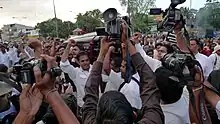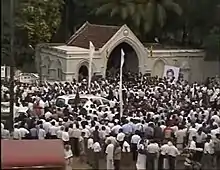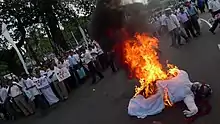| Assassination of Lasantha Wickrematunge | |
|---|---|
 | |
| Location | Ratmalana Colombo, Sri Lanka |
| Date | January 8, 2009 |
| Target | Lasantha Wickrematunge |
Attack type | Sniper assassination |
| Deaths | Lasantha Wickrematunge |
Lasantha Wickrematunge, a Sri Lankan journalist, politician and human rights activist, was fatally shot and assassinated in Colombo, Sri Lanka on January 8, 2009.[1] It is believed that he was killed due to his journalistic work critical of Sri Lankan politicians. His murder was widely condemned across the world. The Government of Sri Lanka also expressed shock at the killing, pledging to do everything in its power to catch his killers.
Background
Due to his work as an investigative journalist, Wickrematunge faced a number of threats and attacks leading up to his assassination. In 1995, masked assailants pulled Wickrematunge and his first wife, Raine, out of their car and attacked them with clubs. Raine later stated that death threats had become part of the routine of their lives: "There were so many threatening calls. 'We are going to kill you. We are going to kill your children.'"[2] In 2002, Wickrematunge's then-wife left Sri Lanka due to the constant threats against their family, taking their three children to Australia.[2]
On September 5, 2000, Lasantha Wickrematunge was found guilty of criminally defaming Sri Lankan President Chandrika Kumaratunga in a 1995 article in The Sunday Leader.[3][4] Wickrematunge was sentenced to two years in jail, suspended for five years.[3][4]
Wickrematunge was threatened by President Mahinda Rajapaksa with whom he had a close personal friendship with for over 20 years. Wickrematunge was allegedly abused in a profanity-laden telephone call on January 11, 2006.[5][6] According to Wickrematunge the President had threatened to "destroy him" over a publication in his newspaper which discussed then First Lady Shiranthi Rajapaksa.[5] Wickrematunge was briefly detained at Bandaranaike International Airport on February 21, 2006, as he arrived for a flight to Geneva.[5][7] Airport officials had claimed that Wickrematunge required "special permission" to leave Sri Lanka.[8]
In late December 2006, an unsuccessful attempt was made to arrest Wickrematunge for "endangering national security" after he published a report exposing an Rs. 500 million luxury bunker to be built in the presidential complex. Criminal Investigation Department personnel had consulted Sri Lanka's then Attorney General, on the possibility of detaining Wickrematunge under Emergency Regulations. Wickrematunge addressed the media and a large gathering of supporters outside the premises of The Sunday Leader and stated that he will not seek safe passage overseas and will face all political oppression levelled against him and "stand unbowed and unafraid". Due to the public outcry and pressure on the Government by the country's Opposition Party and local and international Human Rights organisations, he was not arrested.[5][9]
On December 5, 2008, a judge ordered Leader Publications not to publish any reports about Gotabaya Rajapaksa for two weeks.[10][11]
Assassination

Wickrematunge was shot while he was on his way to work at around 10:30 a.m. on January 8, 2009, a few days before he was scheduled to give evidence about Gotabhaya Rajapaksa's corruption in arms deals before a judge.[12][13] Four armed assassins riding motorcycles blocked Wickrematunge's vehicle before breaking open his window and shooting him.[1] He was taken to the Colombo South Teaching Hospital. A helicopter was put on standby to transfer him to the Colombo National Hospital. A specialist team of 20 medical personnel were called in for the surgery. Despite the surgery lasting nearly three hours, Wickrematunge died from his head wounds.[14]
Response
National
President Mahinda Rajapaksa described the assassination as an attempt to discredit the government, and said he was both grieved and shocked. He also said he had ordered a thorough police inquiry, and called the assassination an "international conspiracy".[15] The Opposition Leader Ranil Wickremesinghe responded, calling the assassination part of an anti-democratic conspiracy, and accused the government of attempting to silence its critics.[16]
The United National Party, Sri Lanka's main opposition party, also staged a demonstration in parliament on January 9 to protest his assassination.[17][18]
International
Wickrematunge's assassination caused an international outcry. Reporters Without Borders said that "Sri Lanka has lost one of its more talented, courageous and iconoclastic journalists," and that "President Mahinda Rajapaksa, his associates and the government media are directly to blame because they incited hatred against him and allowed an outrageous level of impunity to develop with regards to violence against the press".[19] The assassination was condemned by Norway, the United States, the United Kingdom, the European Union, India and Japan, and the United Nations strongly condemned the assassination while the World Bank expressed its concerns over the attack.[20]
The British Secretary of State for Foreign and Commonwealth Affairs, David Miliband, said that the British government condemned the killing of Wickrematunge and said that it was the duty of the authorities to take prompt action into these incidents:
We condemn such brazen attacks. Of particular concern was the murder, on 8 January, of the Chief Editor of The Sunday Leader newspaper, Lasantha Wickrematunge. The Sri Lankan authorities have a duty to take prompt action to ensure that a thorough and independent investigation is carried out.[21]
Lindsay Ross, former executive director, Commonwealth Press Union, London condemned the assassination and said,
His death marks a true low point in the history of a country that has such a long-established and notable media. I have watched the situation deteriorate so badly over the last few years that we are now at the point where many respected journalists go in fear of their lives, many have left the country and some of the most distinguished have remained but are under constant threats and intimidation.[22]
In a statement ahead of World Press Freedom Day Ban Ki Moon called on the government of Sri Lanka to ensure that those responsible for Lasantha Wickrematunge's murder were found and prosecuted.[23]
An editorial in Time magazine called his death "A personal loss to Time".[24]
Wickrematunge's widow of 13 days, Sonali Samarasinghe Wickrematunge, fled the country a month after Wickrematunge's death and now calls herself an editor in exile.[25]
Funeral

The funeral of Lasantha Wickrematunge was one of the largest public funerals held in Sri Lanka. Wickrematunge's funeral was open to the public.[26] Opposition leaders, human rights activists and diplomats demonstrated in protest of his killing.[27]
Investigation
After denying all responsibility for the attack the Rajapaksa government called for an investigation. Despite intense media pressure, no one was arrested, and Sri Lankan media speculated that the murder investigation may "end up as a cover-up", and that safeguards for an independent media appeared bleak.[28][29][30]
After Mahinda Rajapaksa's defeat at the presidential election in 2015, the new government of President Maithripala Sirisena reopened the investigation over allegations that former Defence Secretary Gotabhaya Rajapaksa ordered the assassination.[31][32][33]
Ranil Wickremesinghe, the former Prime Minister, accused Sarath Fonseka, the former army commander, of the murder of Lasantha Wickrematunge in 2008 and 2009.[34][35] In 2011, the former MP Rajiva Wijesinha told the BBC Sinhala Service that the British High Commission in Colombo had told him it possessed evidence that Fonseka was involved in the assassination of Wickrematunge.[36] According to Fonseka, the order for the assassination was given by Gotabaya.[37]
In October 2016, a retired intelligence officer committed suicide and left a note claiming he was the killer of Wickrematunge and that the intelligence officers that were arrested and under investigation were innocent. The intelligence officer's family reported to police that they did not believe the officer's death was a suicide.[13][38]
Investigation done by the CID revealed that the Sri Lankan military had abducted two Tamil youths named Balraj Ram Prakash and Kumarasingham Vishnukumar riding a motorcycle in Vavuniya on 18 January 2009, murdered them and stole their motorcycle in an attempt to frame the LTTE for Wickrematunge's assassination.[39][40]
See also
References
- 1 2 Luft, Oliver (January 8, 2009). "Sri Lankan newspaper editor shot dead". The Guardian. London. Retrieved January 10, 2009.
- 1 2 Gentleman, Amelia (January 16, 2009). "If you write you'll be killed". The Guardian. Archived from the original on December 8, 2010. Retrieved September 12, 2012.
- 1 2 "Suspended jail term for editor". TamilNet. September 5, 2000.
- 1 2 "Calls for Repeal of Criminal Defamation Laws". Committee to Protect Journalists. September 5, 2000.
- 1 2 3 4 Yapa, Vimukthi (November 25, 2007). "Unbowed and Unafraid". The Sunday Leader.
- ↑ "Senior Editor accuses SL President of issuing verbal threats". TamilNet. January 13, 2006.
- ↑ "Editor of Sunday Leader detained at Katunayake". TamilNet. February 21, 2006.
- ↑ "Sunday Leader editor "harassed"". BBC Sinhala. February 20, 2006.
- ↑ "Sunday Leader editor faces arrest". TamilNet. December 28, 2006.
- ↑ "BBC World Service and Sunday Leader newspaper censored". Reporters Without Borders. December 12, 2008. Archived from the original on March 4, 2016.
- ↑ "RSF condemns Colombo's censorship of BBC, Sunday Leader". TamilNet. December 12, 2008.
- ↑ Sirilal, Ranga; Hull, Bryson; Richardson, Alex (January 10, 2009). "Gunmen shoot editor of Sri Lankan opposition paper". Reuters. Retrieved January 10, 2009.
- 1 2 "economynext.com". economynext.com. Retrieved October 14, 2016.
- ↑ "Top Sri Lankan editor shot dead". BBC News. January 8, 2009. Retrieved January 8, 2009.
- ↑ Jansz, Frederica. "A Government Cover-Up". Sunday Leader. Retrieved September 6, 2015.
- ↑ Reddy, Muralidhar. "Editor of Sri Lankan daily assassinated". The Hindu. Retrieved September 6, 2015.
- ↑ "Sri Lankan journalists, media rights act". Getty Images. Retrieved September 6, 2015.
- ↑ Hull, Bryson. "Anger rises over killing of Sri Lankan editor". Reuters. Retrieved September 6, 2015.
- ↑ Lawson, Alastair (January 8, 2009). "Grievous blow to Sri Lankan media". BBC. Retrieved September 6, 2015.
- ↑ "US, UK, India condemn attacks". BBC. Retrieved September 6, 2015.
- ↑ "TamilNet". www.tamilnet.com.
- ↑ "FREEDOM at NADIR". www.sundaytimes.lk.
- ↑ "Slain Sri Lankan journalist honoured with UN press freedom award". UN News. April 6, 2009.
- ↑ Thottam, Jyoti (January 15, 2009). "A Personal Loss" – via content.time.com.
- ↑ "The Death Of A Newspaper – The Sunday Leader". October 17, 2012.
- ↑ "Lasantha Wickrematunge – HRD Memorial". Retrieved July 14, 2022.
- ↑ "Sri Lanka's War On Journalists". new Matilda. January 13, 2009.
- ↑ Thottam, Jyoti. "Dying for Journalism: Lasantha Wickrematunge of Sri Lanka". Time. Retrieved September 6, 2015.
- ↑ "Lasantha murder: No police progress despite Sri Lanka President promise". Tamil Week. Retrieved September 6, 2015.
- ↑ Perera, Melani. "No justice for Lasantha, a year after the journalist's murder". Asian News. Retrieved September 6, 2015.
- ↑ "Sri Lanka to reopen investigation into 2009 murder of Lasantha Wickrematunge". International Federation of Journalists. Retrieved September 6, 2015.
- ↑ "Sri Lanka to reopen Lasantha murder case". Colombo Mirror. Retrieved September 6, 2015.
- ↑ "Sri Lanka to recommence probe on high-profile assassinations". Department of Government Information. Retrieved September 6, 2015.
- ↑ "Who Is Sarath Fonseka". The Sunday Leader. Retrieved January 8, 2012.
- ↑ "S Lankan general 'behind attacks'". BBC News. Retrieved July 8, 2008.
- ↑ "British HC in Colombo has evidence of SF's involvement in Lasantha killing". The Island. Retrieved April 11, 2012.
- ↑ "Fireworks in Parliament: Who Killed Lasantha?Field Marshal Fonseka responds…".
- ↑ "Alleged suicide note: Rtd. Army officer claims he killed Lasantha". Retrieved October 14, 2016.
- ↑ "Evidence unfolding before courts on Lasantha's Murder". Daily Mirror. March 28, 2018. Retrieved December 6, 2023.
- ↑ "Facts Of Operation Kill Lasantha". Colombo Telegraph. January 23, 2018. Retrieved December 6, 2023.
